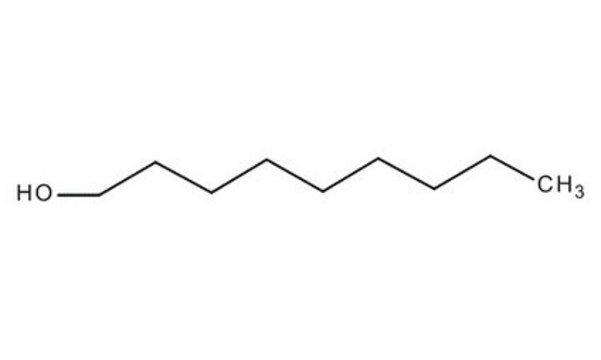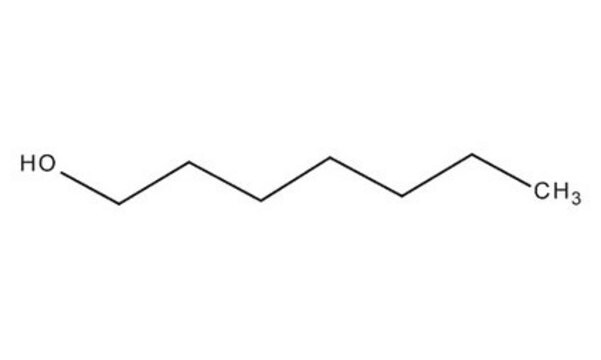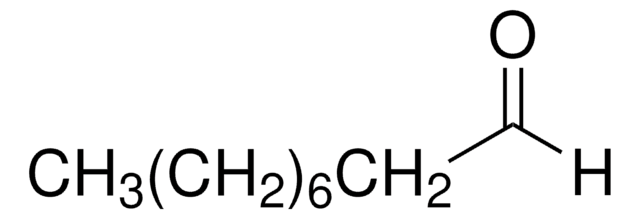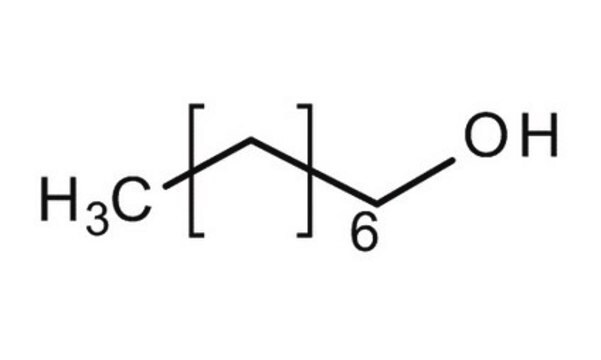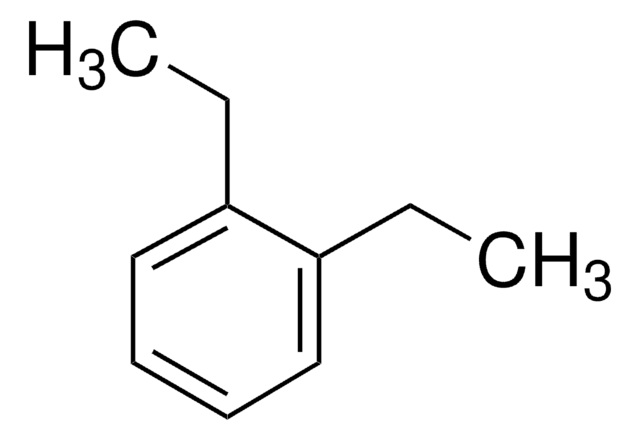131210
1-Nonanol
98%
Synonym(s):
Alcohol C9, Nonyl alcohol
Sign Into View Organizational & Contract Pricing
All Photos(3)
About This Item
Linear Formula:
CH3(CH2)8OH
CAS Number:
Molecular Weight:
144.25
Beilstein:
969213
EC Number:
MDL number:
UNSPSC Code:
12352100
eCl@ss:
39020223
PubChem Substance ID:
NACRES:
NA.22
form:
liquid
Assay:
98%
Recommended Products
vapor density
5 (vs air)
Quality Level
vapor pressure
13 mmHg ( 104 °C)
Assay
98%
form
liquid
refractive index
n20/D 1.433 (lit.)
bp
215 °C (lit.)
mp
−8-−6 °C (lit.)
density
0.827 g/mL at 25 °C (lit.)
functional group
hydroxyl
SMILES string
CCCCCCCCCO
InChI
1S/C9H20O/c1-2-3-4-5-6-7-8-9-10/h10H,2-9H2,1H3
InChI key
ZWRUINPWMLAQRD-UHFFFAOYSA-N
Looking for similar products? Visit Product Comparison Guide
General description
1-Nonanol inhibited the bacterial luciferase (BL) reaction in a dose-dependent manner.
Application
1-Nonanol can be used:
- As a reference material in the determination of airborne fungal spore levels using GC-MS method.
- To prepare polysulfone capsules as ideal adsorbents used in the removal of phenol from an aqueous solution.
- As a solvent in the study of swelling properties of hummers graphene oxide membranes.
Signal Word
Warning
Hazard Statements
Precautionary Statements
Hazard Classifications
Aquatic Chronic 3 - Eye Irrit. 2
Storage Class Code
10 - Combustible liquids
WGK
WGK 2
Flash Point(F)
208.4 °F - closed cup
Flash Point(C)
98 °C - closed cup
Personal Protective Equipment
dust mask type N95 (US), Eyeshields, Gloves
Choose from one of the most recent versions:
Already Own This Product?
Find documentation for the products that you have recently purchased in the Document Library.
Customers Also Viewed
Swelling of graphene oxide membranes in alcohols: effects of molecule size and air ageing
Iakunkov A, et al.
Journal of Material Chemistry A, 7(18), 11331-11337 (2019)
A L Sunesson et al.
The Annals of occupational hygiene, 40(4), 397-410 (1996-08-01)
Two fungal species commonly found in indoor environments, Penicillium commune and Paecilomyces variotü, were cultivated on pine wood and on a combination of gypsum board and mineral wool. Air from the cultures was adsorbed on Tenax TA and analysed using
G Mougabure Cueto et al.
Journal of medical entomology, 39(3), 457-460 (2002-06-14)
The effectiveness of 1-octanol, 1-nonanol, 1-decanol, 1-undecanol, and 1-dodecanol was evaluated by immersion method against susceptible and permethrin-resistant head lice, Pediculus humanus capitis De Geer, from Buenos Aires, Argentina. All the tested alcohols showed knockdown effect at 10 min and
M Hori et al.
Journal of pharmaceutical sciences, 81(4), 330-333 (1992-04-01)
The fluxes of representative hydrophilic (propranolol hydrochloride) and lipophilic (diazepam or indomethacin) drugs, administered as ethanolic solutions containing putative penetration enhancers (n-nonane, 1-nonanol, and 1-decanol), were measured across hairless mouse skin in vitro. Propranolol transport was augmented significantly by the
D M Greene-McDowelle et al.
Toxicon : official journal of the International Society on Toxinology, 37(6), 883-893 (1999-05-26)
The fungi Aspergillus flavus and Aspergillus parasiticus produce the hepatocarcinogenic, secondary metabolites, aflatoxins, in cottonseed, corn, peanuts and treenuts. Results have shown that aflatoxigenic strains of A. flavus and A. parasiticus grown in the presence of specific cotton-leaf volatiles exhibit
Our team of scientists has experience in all areas of research including Life Science, Material Science, Chemical Synthesis, Chromatography, Analytical and many others.
Contact Technical Service
